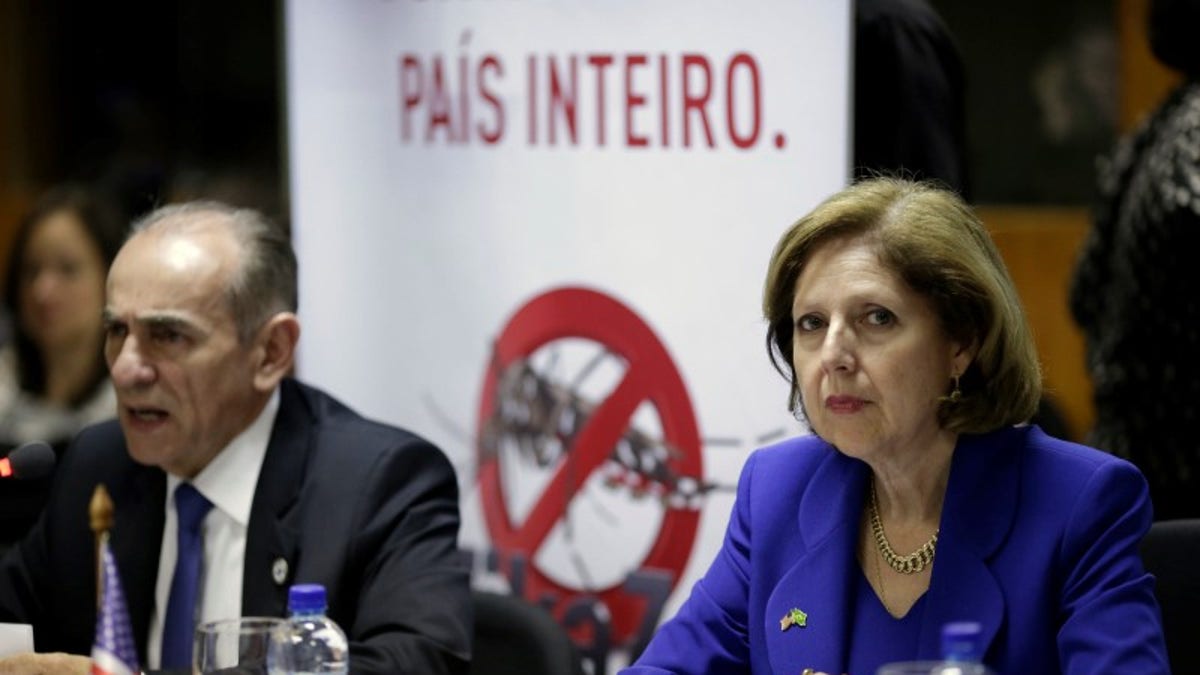
Brazil's Health Minister Castro speaks near U.S. Ambassador to Brazil Ayalde during a meeting to discuss new steps for monitoring the Zika outbreak with U.S. officials in Brasilia (Copyright Reuters 2016)
BRASILIA – Top U.S. and Brazilian medical experts met on Thursday to launch a research partnership to find a vaccine against the Zika virus that has spread rapidly since it first appeared in the Americas last year.
Brazilian Health Minister Marcelo Castro said the experts would also pool resources and knowledge during the two-day meeting to develop better methods to test people for Zika and ways to eradicate the mosquito that spreads the virus linked to severe birth defects.
Brazil, where the virus first appeared in the Americas, is scrambling to contain the Zika outbreak that threatens attendance at the Olympic Games in Rio de Janeiro in August. Officials there have advised pregnant women to stay at home.
Researchers from the U.S. National Institutes of Health and the Centers for Disease Control and Prevention (CDC), along with experts from the Food and Drug Administration and the Health and Human Services department met with counterparts from Brazil's leading biomedical research institutions.
"We want to leave here with more direction and coordination of the various research efforts underway in different areas," said Paulo Gadelha, head of the Fiocruz public health research center. While the ultimate goal is a vaccine, there is a lot of work to be done and shared on how the virus operates, he said.
Among the issues they face is the need to agree on the evidence that Zika is causing the hundreds of confirmed cases in Brazil of babies born with abnormally small heads, a condition called microcephaly, and with other neurological diseases.
The World Health Organization (WHO), which declared the Zika outbreak a global public health emergency on Feb. 1, said last week that a stronger view of Zika's link to microcephaly could become clearer within weeks.
While that relation has not been proven scientifically Brazilian authorities coping with an unprecedented number of babies with microcephaly say they are sure Zika is the cause, because most cases of microcephaly have occurred in the poorer northeast of Brazil where the Zika outbreak has hit hardest.
"We have no doubt that the epidemic of microcephaly that we are seeing in Brazil is caused by the Zika virus outbreak," Castro told reporters on the sidelines of Thursday's meeting.
Brazil's Health Ministry announced on Wednesday that it was considering most of the 508 confirmed cases of microcephaly in the country to be linked to the Zika outbreak.
Castro said Brazil was making the reporting of all Zika cases mandatory, a step that had not been taken before due to the lack of kits to test for Zika that has hindered collection of more accurate statistics. An estimated 1.5 million people have been infected by Zika in Brazil.
The government will distribute 500,000 molecular biology test kits this year for diagnosing Zika in 27 labs around Brazil, which will improve its grasp of the outbreak, he said.
WHO Director General Margaret Chan will visit Brazil next week to meet health officials in Brasilia and visit mothers with babies suffering from microcephaly in the northeastern city of Recife, at the epicenter of the epidemic in Brazil, Castro said.